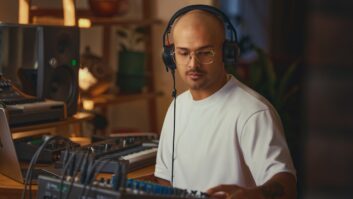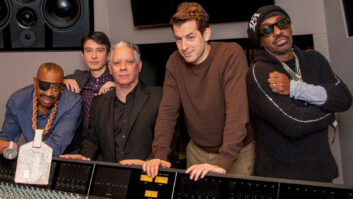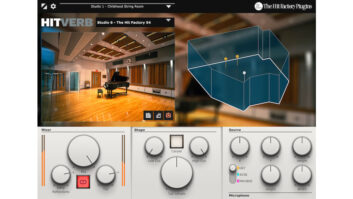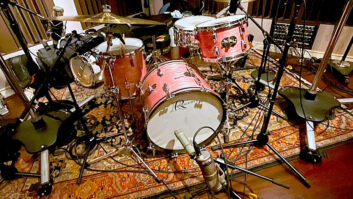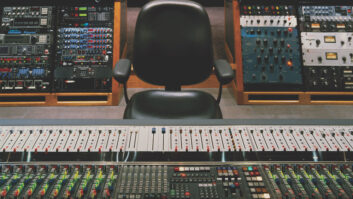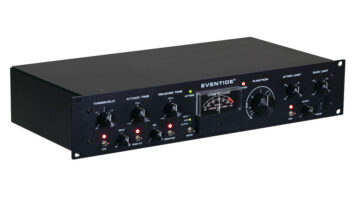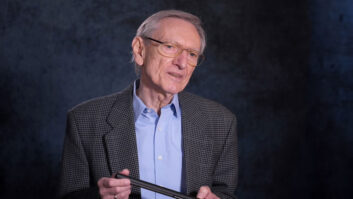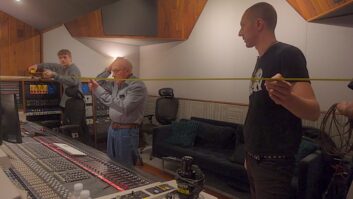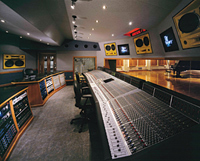
In the studio business, Hit Factory Criteria stands apart. Fifty years is a lifetime for any business, especially one that combines art and technology. In that time, the studio has helped shape the music industry’s leading lights across six decades and countless idioms: Eric Clapton, the Bee Gees, The Eagles, Bobby Vinton, Bob Marley, Duke Ellington, Coldplay, Placido Domingo, Fleetwood Mac, Sam & Dave, Mariah Carey, Jay Z, The Hives, Missy Elliott, Michael Jackson and Madonna. They have made records with the cream of the industry’s producers and engineers, including Phil Ramone, Ed Cherney, Al Schmitt, Eric Schilling, Ron and Howard Albert, Jerry Wexler and Tom Dowd.
“If I could tell you the formula we had for becoming this successful, I’d put it in a bottle and sell it,” quips Trevor Fletcher, who started in 1983 and became general manager in 2000 and VP in 2005. “But I do know some of the things that contributed. We’re in Miami, not New York, Los Angeles or Nashville — the cities everyone traditionally associates with music recording in the U.S. Miami is a place you come to escape to. But it’s also the crossroads of many musical cultures, as easy to get to from São Paulo and Buenos Aires or London and Paris as L.A. or New York.”
But they came for more than that. They came for the legacy, and the mix of cutting-edge technology and top technical talent. Fletcher points out that keeping the facility at the top of the tech pyramid has been a key philosophy ever since jazz recording enthusiast Mack Emerman decided in 1958 to stop trundling his tape recorders and microphones from club to club in Miami in the back of his station wagon and put together a place that would attract those players and others to the charms of South Florida.
While Emerman was a jazz buff, the establishment of a state-of-the-art recording studio with custom-built consoles and a 3-track multitrack created its own kind of gravity, drawing talent across a range of styles and genres.
Emerman loved technology, and he encouraged local electronics genius Jeep Harned to continue to refine the breakthroughs he was making after Emerman enlisted him to tweak Criteria’s recording systems. (By 1965, Harned’s work at Criteria led him to found MCI, the console and tape deck maker that laid the foundation for the 24-track world of the 1970s and ’80s, as well as auto-location and split-console concepts.)
The studio has always been all about top-of-the-line technology, investing in battleship consoles, from the ageless Neve 8078 to an SSL Duality. “They always kept it up as a technology showcase,” recalls Grammy-winning engineer/mixer/producer Eric Schilling, who has used Criteria numerous times over four decades. “Really, the whole recording scene in South Florida stems from this one facility.”
The hits started pouring out of the studio in 1965, starting with James Brown’s “I Feel Good” — Criteria’s first Gold record. Local artists quickly made Criteria their home base, including Steve Alaimo and Betty Wright. And after Tom Dowd and producer Jerry Wexler discovered the studio, much of the Atlantic Records roster would travel to Miami to record, including music royalty such as Aretha Franklin and Wilson Pickett.
Producer Bill Szymczyk was also lured to Criteria’s investment in technology. “I told them that if they would upgrade Studio C from 16 tracks to 24, I’d move there,” he says. They did, he did, and over the next 17 years Szymczyk did records there with The Eagles, Elvin Bishop, Wishbone Ash, The Outlaws and many others.
The studio grew from Emerman’s original single studio to a total of five studios by 1983, with a sixth added in 2000. Technology was part of the attraction at Criteria, and as Fletcher points out, the studio’s location away from pricier beach real estate helped make the expansions possible. “It was rare then, and even more so now, to have the luxury to build rooms that had 22- and 27-foot ceilings,” he says. “Each studio has its own unique acoustic character, giving you access to sounds that you can’t easily re-create digitally. When you combine that with a wide range of technology, what you’re giving the client are many levels of options to find a sound, to find a feel.”
The sheer number of studio rooms and the tropical atmosphere encouraged artists to linger over recording projects. It was not unusual to have Eric Clapton (who recorded both Derek & The Dominos’ Layla and his own 461 Ocean Blvd. there), The Eagles (much of Hotel California was done there) and the Bee Gees essentially setting up residence there. In its heyday, managing Criteria was as much a concierge proposition as it was a technical one. With a 30-member staff, “It was like a five-star hotel that just happened to also make records,” says Fletcher. And as in any fine establishment, the Criteria staff happily accept their clients’ eccentricities, as Fletcher explains by recounting a moment during the recording of Iggy Pop’s Skull Ring LP: “I’m sitting in my office and I hear all sorts of noise going on outside. I go downstairs and Iggy is sitting in his vintage convertible Caddy. There are cables hanging out of the hood, and he is leaning on the horn repeatedly. I walked over, and said ‘What’s up, Iggy?’ He turns around with a big smile on his face, and says, ‘I’m doin’ horn overdubs, man!’ I just went back to my office. What can you say?”
In 1999, renowned multiroom Manhattan recording facility Hit Factory acquired Criteria, infusing the studio with a jolt of fresh capital to fund further renovations and technology updates. “There were obviously some differences in the cultures of the two facilities, but much of those complemented each other, such as Hit Factory’s emphasis on the business side of studio operations and Criteria’s understanding of so many different musical cultures,” says Bob Lanier, COO of Hit Factory Entertainment, the studio’s holding company. “And what they shared was just as important: Both studios put a premium on service to the client.” With the closure of Hit Factory’s facilities in New York in 2005, Hit Factory Criteria Miami took on the mantle of carrying both studios’ remarkable legacies into the future.
In all of its incarnations, Hit Factory Criteria’s location at the nexus of Caribbean and Latin American cultures has kept the studio at the forefront of several generations of Latin artists, including Placido Domingo, Gloria Estefan, Jose Feliciano, Ricky Martin, Juanes and Maná. It would find itself in that same position as urban music genres became more mainstream, as well, in the 1990s and into the next century. Timbaland, Jay-Z, Usher, Lil’ Wayne, Mary J. Blige, Nelly Furtado and other hip-hop hitmakers are regular clients at Hit Factory Criteria, despite most of them having their own very well-equipped personal recording studios. “I think that speaks for itself,” Fletcher says. “In this day and age, when people can have pretty sophisticated recording systems in their homes or personal studios, they will still come to a commercial facility like this where the service is the key.”
The same forces that have drastically changed the fortunes of the music recording industry have buffeted Hit Factory Criteria, but coping strategies and tactics have also emerged. “We have adapted to the fact that instead of one artist and producer spending three months here working on a single project, we now have two or three producers working on one or two tracks for a few days or a week, or producers working with several artists simultaneously,” Fletcher explains. “Music trends are more cyclical now and we’ll go from hip-hop to pop to Latin to rock in the span of a few weeks. The business moves faster and we’ve had to change accordingly. We always have.”
Dan Daley is a freelance writer based in New York and Nashville.
